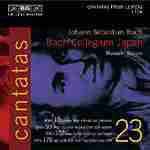
Bach, J.S. - Cantatas Vol. 23 (Nos 10, 93, 107 & 178)
 $35.00
Out of Stock
$35.00
Out of Stock2-6 weeks add to cart
Bach, J.S. - Cantatas Vol. 23 (Nos 10, 93, 107 & 178)
Yukari Nonoshita, soprano; Matthew White, counter-tenor; Makoto Sakurada, tenor; Peter Kooij, bass; Bach Collegium Japan directed by Masaaki Suzuki
[ BIS / CD ]
Release Date: Monday 1 December 2003
This item is currently out of stock. We expect to be able to supply it to you within 2 - 6 weeks from when you place your order.
"These are magnificent performances, displaying exceptional unanimity of purpose and effortless solo singing which is at once self-effacing and powerfully involving. Highly recommended."
- Highly recommended International Record Review (May 2004)
This is the 23rd volume of church cantatas by JS Bach performed by the voices and instruments of the Bach Collegium Japan under their illustrious director Masaaki Suzuki.
This series of course by now has a great following and is very well-established among the critics. In fact, the preceding volume, No. 22, has just received the prestigious French Diapason d'Or for the year 2003.
The current volume presents the Leipzig cantatas composed for four different Sundays after Trinity in the year of 1724. During this particular year, the Feast of the Visitation happened to fall on one of the Sundays in question, and in BWV 10 'Meine Seel erhebt den Herren', Bach took the opportunity of setting the Biblical text of the Magnificat (in a solidly Lutheran German translation, of course!), traditionally read during this celebration. Bach's use of the old melody associated with this text, instead of the usual, more "modern", chorale lends a particular atmosphere to the cantata.
Listening to the cantatas on this disc one again marvels at the fact that there are masterpieces of this calibre that have remained so little known and so infrequently performed. (And there is some particularly impressive "natural trumpet" playing that adds to the excitement.) Eagerly awaited by the many fans of the cycle - it is also an excellent starting point for those who have yet to become acquainted with the BCJ's Bach cantatas.
Tracks:
Cantatas 23. 'Meine Seel erhebt den Herren', BWV10
'Wer nur den lieben Gott läßt walten', BWV93
Cantata No.178, 'Wo Gott der Herr nicht bei uns hält', BWV178
Cantata No.107, 'Was willst du dich betrüben', BWV107

